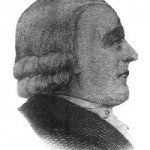
Last month we introduced John Sutcliff, pastor of the Olney Baptist Church, Buckinghamshire. In the 1780s, Sutcliff became increasingly involved in the affairs of the Northamptonshire Association of Baptist Churches, to which his church belonged.
He drew up the circular letter that the association sent annually to its member churches, both in 1779 (on the subject of divine providence) and 1786 (on the Lord’s Day). And in 1784 he presented to the association a proposal that would have far-reaching implications.
Edwards’ Humble Attempt
Earlier that year Sutcliff had acquired a treatise by the North American theologian Jonathan Edwards (1703-1758) entitled An Humble Attempt to Promote Explicit Agreement and Visible Union of God’s People in Extraordinary Prayer, For the Revival of Religion and the Advancement of Christ’s Kingdom on Earth.
In this treatise, first published in 1748, Edwards appealed for the establishment of regular prayer meetings where there could be fervent prayer that God ‘would appear for the help of his church, and in mercy to mankind, and pour out his Spirit, revive his work, and advance his spiritual kingdom in the world’.
The treatise came to Sutcliff through John Erskine (1721-1803), who had corresponded with Edwards in his younger years and was the minister of the historic church of Old Greyfriars, Edinburgh.
Erskine has been well described as ‘the paradigm of Scottish evangelical missionary interest through the last half of the eighteenth century’. From 1780 till his death in 1803 he regularly corresponded with Sutcliff’s close friend John Ryland Jr (1753-1825), sending him not only letters but also on occasion bundles of interesting publications which he happened to receive.
So it was that in April 1784 Erskine dispatched to Ryland a copy of Edwards’ Humble Attempt. Ryland in turn shared it with his friends Sutcliff and Andrew Fuller (1754-1815).

The prayer-call of 1784
Sutcliff was so impressed by this treatise that at the next meeting of the Baptist churches of the Northamptonshire Association he proposed that monthly prayer meetings be established to pray for the outpouring of God’s Spirit and the revival of religion.
This proposal was adopted by the representatives of the twenty or so churches of the association. It was attached to the circular letter sent out that year and called for them ‘to wrestle with God for the effusion of his Holy Spirit’.
Practical suggestions on how to implement these monthly meetings followed. It was recommended that there be corporate prayer for one hour on the first Monday evening of each month. The call then continued:
‘The grand object in prayer is to be, that the Holy Spirit may be poured down on our ministers and churches, that sinners may be converted, the saints edified, the interest of religion revived, and the name of God glorified.
‘At the same time remember, we trust you will not confine your requests to your own societies [i.e. churches], or to your own immediate connection [i.e. denomination]; let the whole interest of the Redeemer be affectionately remembered, and the spread of the gospel to the most distant parts of the habitable globe be the object of your most fervent requests
‘We shall rejoice if any other Christian societies of our own or other denominations will unite with us, and do now invite them most cordially to join heart and hand in the attempt.’
Noteworthy points
There are at least three noteworthy points about this call to prayer, which Sutcliff had undoubtedly helped to write.

First, there is the conviction that reversing the downward trend of the Calvinistic Baptists could not be accomplished by mere human zeal, but must be effected by an outpouring of the Spirit of God. As Sutcliff later observed in another writing:
‘The outpouring of the divine Spirit … is the grand promise of the New Testament. …His influences are the soul, the great animating soul of all religion. These withheld, divine ordinances are empty cisterns, and spiritual graces are withering flowers.
‘These suspended, the greatest human abilities labour in vain, and the noblest efforts fail of success.’
In both this text and that of the circular letter cited above, there is evidence of a theology of radical dependence on the Spirit, a recognition that the Spirit is the true agent of renewal and revival.
Second, there is the inclusive nature of the recommended praying. As the Calvinistic Baptists of the Northamptonshire Association gathered to pray together they were urged to direct their thoughts beyond the confines of their own churches and denomination, and embrace in prayer other Baptist churches and other denominations.
In fact, churches of other denominations, along with those of other Baptist associations, were encouraged to join them in praying for revival.
Third, there is the distinct evangelistic or missionary emphasis. The readers of this prayer-call are encouraged to pray that the gospel be spread ‘to the most distant parts of the habitable globe’.

Jealousy for the Lord of hosts
Another text that draws together these themes of prayer and evangelism is found in what appears to be Sutcliff’s only extant sermon, Jealousy for the Lord of Hosts illustrated. It was preached on 27 April 1791 to a gathering of the ministers of the Northamptonshire Association at Clipston, Northamptonshire.
The sermon was based on 1 Kings 19:10 – in particular Elijah’s statement: ‘I have been very jealous for the Lord God of hosts’.
Sutcliff first explores the historical context surrounding Elijah’s statement. He comes to the conclusion that while Elijah’s statement contains a ‘degree of impatience … and murmuring’, his jealousy for God is commendable, because such jealousy ‘enters deep into, and is integrated in the very soul of true Christianity’.
Sutcliff proceeds to detail the ways in which such a jealousy manifests itself. As he does so, two characteristics come to the fore.
First, Sutcliff lays great stress on the vital importance of bringing the entirety of one’s beliefs and life into conformity with the revealed will of God as found in the Scriptures. True jealousy for God is accompanied by a reverent obedience to God’s Word.
Expanding the kingdom
Second, Sutcliff emphasises the visible extension of ‘the empire of Jesus’. True jealousy for God is revealed in a love for men which ‘can embrace a globe’ and which longs that ‘the earth be filled with the knowledge of the glory of the Lord’.
Such a longing is first expressed in ‘Fervent prayer for the outpouring of the divine Spirit … Anxious to see the advancement of the Redeemer’s kingdom, you will give vent to your fervent desires by warm addresses at a throne of Grace’.
Then it is seen in an evangelistic lifestyle that takes seriously God’s desire for his people to be the salt and light of the world. Reflecting on the calling of all of God’s people, Sutcliff declares:

‘Are they not the Salt of the earth? It is not proper that the Salt should lie all in one heap. It should be scattered abroad. Are they not the Light of the world? These taken collectively should, like the Sun, endeavour to enlighten the whole earth.
‘As all the rays, however, that each can emit, are limited in their extent, let them be dispersed, that thus the whole globe may be illuminated. Are they not Witnesses for God? It is necessary they be distributed upon every hill, and every mountain, in order that their sound may go into all the earth, and their words unto the ends of the world.’
Balance
In commending this balance of ardent prayer and vigorous evangelistic effort, Sutcliff was not only describing what he regarded as characteristics of genuine Christianity, but he was also outlining measures he considered essential for revival. When these marks of true jealousy for God are present, he concludes:
‘This will tend to promote the interests of religion in the world. The cause of Christ will prosper; he must increase; his kingdom shall come. But, though he is indebted to none, he kindly condescends to employ his people in accomplishing these glorious purposes…
‘Under the divine smile, Satan will fall before you like lightning from heaven; his power be broken; his policy confounded: while the empire of Jesus shall advance; his kingdom arise; and the crown flourish upon his head.’
The sermon’s significance
One cannot help but notice ‘the mood of expansion and optimism’ which pervades this conclusion to Sutcliff’s sermon, a mood that is present throughout much of the discourse. Little wonder, then, that this sermon was later recognised as a key step on the road to the formation of the Baptist Missionary Society (BMS) in 1792.
This same mood also permeates the prayer call of 1784, as F. A. Cox (1783-1853) was quick to discern when writing on the 50th anniversary of the founding of the BMS:
‘The primary cause of the missionary excitement in [William] Carey’s mind, and its diffusion among the Northamptonshire ministers [was] … the meeting of the association in 1784 … [when] it was resolved to set apart an hour on the first Monday evening of every month, “for extraordinary prayer for the revival of religion, and for the extending of Christ’s kingdom in the world”.
‘This suggestion proceeded from the venerable Sutcliff. Its simplicity and appropriateness have since recommended it to universal adoption; and copious showers of blessings from on high have been poured forth upon the Churches.’








